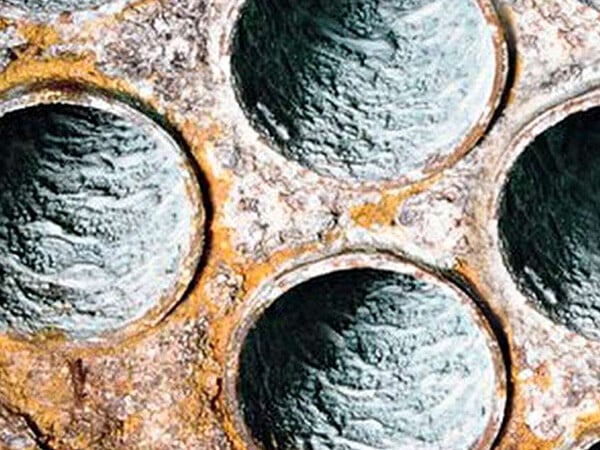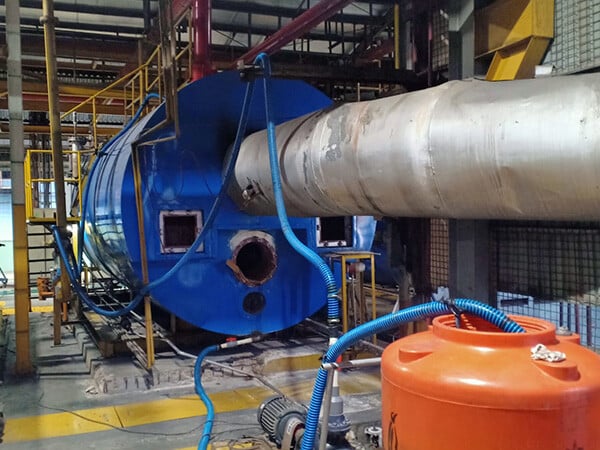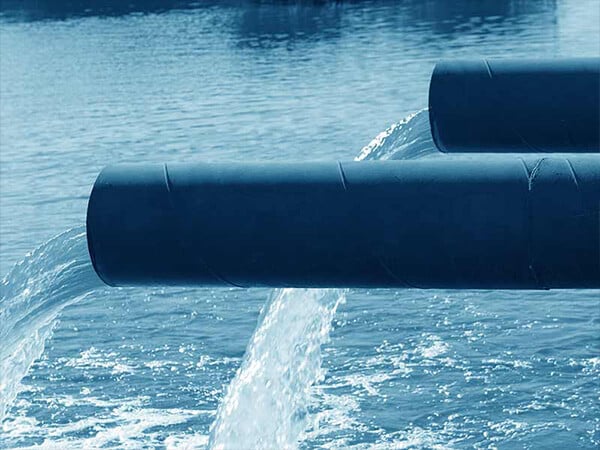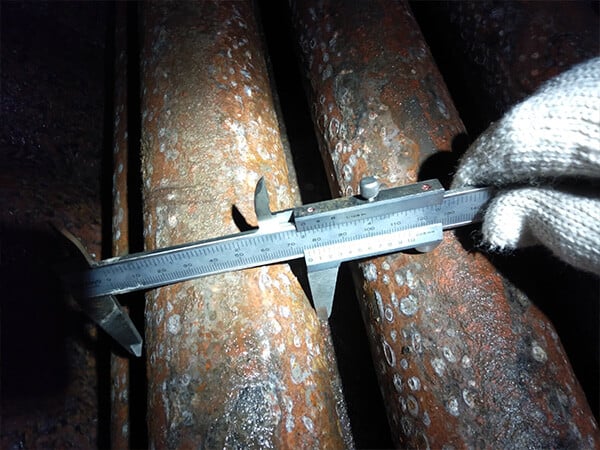In the industrial world of water and sewage treatment, the challenge of keeping systems working optimally is not simple. One of the keys to overcoming this challenge is the use of "Scale and Corrosion Inhibitors," a critical solution that plays a vital role in maintaining the quality and durability of treatment systems. These inhibitor products are specifically designed to prevent the formation of hard mineral deposits that can impede flow and heat exchange-and protect system components from corrosion, a material degradation process that can drastically reduce equipment efficiency and lifespan.
In addition, the use of inhibitors is a vital part of the water treatment process.
In addition, the use of these inhibitors also supports environmental sustainability by reducing the risk of pollution that results from leaks or system failures due to corrosion. This demonstrates the company's commitment to industrial practices that are not only economical but also environmentally friendly. In a context of ever-increasing demands for efficiency and sustainability, "Scale and Corrosion Inhibitor" offers an elegant and effective solution, making it an integral component of any successful water and sewage treatment operation.

What is Scale and Corrosion?
Scaling not only reduces heat exchange efficiency in boilers and heat exchangers but can also increase fuel consumption, resulting in higher running costs. Significant scale formation can lead to blockage of water flow, which in turn requires more frequent maintenance and cleaning, adding to workload and maintenance costs.
On the other hand, corrosion can cause leaks that are not only a safety hazard but also lead to product contamination, especially in industries that require high levels of water purity such as pharmaceuticals and food and beverage. Corrosion can accelerate equipment wear and tear, resulting in costly equipment replacements and operational downtime.
Furthermore, the interaction between scale and corrosion often exacerbates each other. Scale can retain moisture on metal surfaces, which accelerates the corrosion process, while corrosion can provide an ideal site for further scale formation. Therefore, controlling scale and corrosion is not only important to maintain the efficiency and longevity of equipment but also to prevent destructive cycles that can result in greater losses.
Tackling the problem of scale and corrosion requires a comprehensive strategy that includes proper selection of construction materials, regular maintenance and cleaning, and the use of effective scale and corrosion inhibitors. With a deep understanding of the chemical properties of water and the interaction of materials in the system, it is possible to implement water treatment solutions that not only prevent scale formation and corrosion but also improve the overall performance and reliability of the water treatment system.

The Role of Scale and Corrosion Inhibitors
Scaling and corrosion inhibitors play a vital role in optimizing the performance and extending the life of water treatment systems by actively reducing the risk of scale formation and corrosion. The mechanism of action of these inhibitors involves a variety of chemical and physical strategies, including the control of water pH, the formation of passive films on metal surfaces, as well as the sequestration of ions that contribute to scale formation and corrosion processes.
The types of inhibitors used vary depending on the specific conditions of the system, including the type of metals present in the system, operational temperature, pH, and ion concentration in the water. Phosphate inhibitors, for example, are effective in controlling calcium scale formation, while zinc-based inhibitors can reduce corrosion of carbon steel. Silicate-based inhibitors are often used to protect metal surfaces in high-temperature systems.
A proper selection of inhibitors is required.
The proper selection of inhibitors requires a comprehensive analysis of the chemical properties of the water, including hardness, alkalinity, and specific ion content, as well as an understanding of the dynamics of the water treatment system itself. This selection process often involves laboratory and pilot-scale tests to determine the most effective inhibitor formula for specific conditions.
Inhibitor deployment must also involve the application of inhibitors.
Inhibitor application must also be customized to the system, with dosage determined based on water volume, flow rate, and system characteristics. Proper dosage management is essential to ensure inhibitor effectiveness and prevent side effects, such as secondary scale formation or over-dosing that can damage the system.
In addition, monitoring and monitoring of the inhibitor dosage are essential to ensure the effectiveness of the inhibitor.
In addition, regular monitoring and maintenance of the system is key to ensuring scale and corrosion inhibitors perform as expected. This includes periodic testing of water quality and metal conditions, as well as inhibitor dosage adjustments based on the results of these tests.
With a deep understanding of the role and application of scale and corrosion inhibitors, the water and sewage treatment industry can significantly improve operational efficiency, reduce maintenance costs, and extend the service life of infrastructure and equipment. This demonstrates how important inhibitors are in a comprehensive water management strategy, ensuring the sustainability and reliability of water treatment systems across a wide range of industrial applications.
 Figure>.
Figure>.
Benefits of Using Scale and Corrosion Inhibitors
The effective use of scale and corrosion inhibitors not only extends the service life of water treatment systems and equipment but also helps in optimizing energy usage. Systems free from scale and corrosion operate more efficiently, reducing energy requirements and greenhouse gas emissions. This directly contributes to a more sustainable and environmentally friendly operation.
In addition, by reducing the frequency of maintenance and repairs, the use of scale and corrosion inhibitors reduces operational downtime, which is critical in industries that require continuity of production such as the food and beverage, pharmaceutical, and power generation industries. Reduced downtime means more stable production and better cash flow predictability for the company.
Another benefit of using these inhibitors is the reduction of long-term operational costs. Although there is an initial cost for the purchase and application of inhibitors, the resulting savings from extended equipment life, reduced energy costs, and reduced maintenance and repair costs more than compensate. This makes scale and corrosion inhibitors a smart investment for any water treatment operation.
It is also important to note that the use of inhibitors helps in complying with environmental regulations. By reducing the potential for contamination and leakage of chemicals into the environment, companies can ensure that they are not only meeting industry standards but also contributing to the protection of the environment.
.
Finally, the successful use of scale and corrosion inhibitors depends on proper product selection and accurate dosage management. Consultation with a water treatment expert can help determine the most effective product combination for the specific conditions of the water system, optimizing benefits and minimizing risks. As such, the use of inhibitors is not just about protecting equipment but also about adopting a more responsible and sustainable approach to water resource management.
 Figure>.
Figure>.
Choosing the Right Scale and Corrosion Inhibitor
Selecting the right scale and corrosion inhibitor is a critical step in optimizing operations and extending the life of water treatment systems. In the selection process, factors such as water pH, operational temperature, presence of oxygen, and concentration of certain ions must be considered as each can affect the efficacy of the inhibitor. In addition, specific characteristics of the system, such as water flow, construction material, and exposed area, also play an important role in determining the type of inhibitor to be used.
Consulting an expert is not only about optimizing the operation and extending the life of the water treatment system, but also extending the life of the system.
Expert consultation not only helps in selecting the appropriate inhibitor but also in determining the right dosage and application method. This is important as the use of inappropriate doses of inhibitors can be ineffective or even potentially damaging. Experts can assist in conducting water quality analysis and system evaluation to ensure that the selected inhibitor will provide maximum protection against scale and corrosion.
In addition, it is also important to choose an inhibitor that is suitable for the water quality of the plant.
In addition, it is also important to consider applicable environmental regulations and standards. Some inhibitors may contain chemicals that are restricted or prohibited in certain uses due to potential environmental impacts. Therefore, choosing an inhibitor that is environmentally friendly and meets local regulations not only supports operational sustainability but also ensures compliance with environmental laws and policies.
Finally, the evaluation of the performance of the inhibitor is important.
Finally, periodic evaluation of inhibitor performance is key to ensuring long-term effectiveness. This involves water quality testing and regular system inspections to monitor the success of the scale and corrosion control program. With a proactive approach and continuous adjustments based on test results, Beta Pramesti Asia can ensure that its water treatment system is optimally protected against scale and corrosion, extending system life and maintaining operational efficiency.
-
Companies and water treatment system operators must not only focus on proper inhibitor selection but also on dose optimization and continuous performance monitoring. The integration of advanced monitoring technologies and predictive analytics can provide valuable insights for more effective scale and corrosion management, enabling timely interventions and strategy adjustments before problems escalate.
Furthermore, collaboration with scaling and corrosion experts is essential.
Furthermore, collaboration with leading experts and solution providers in the field of water treatment can unlock access to the latest innovations and industry best practices. The inter-industry exchange of knowledge and experience can accelerate the adoption of more sustainable and effective approaches to managing scale and corrosion, benefiting all parties involved.
Thus, "Scale and Corrosion Inhibitors" are not only a tool to protect water and sewage treatment systems, but also an important aspect of a comprehensive water management strategy that supports sustainability and efficiency goals. A commitment to innovation, education, and inter-industry cooperation will strengthen our ability to meet the challenges of scale and corrosion, ensuring the safety, reliability, and performance of water treatment systems for the foreseeable future.
.
